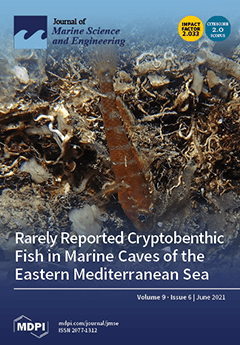An effective approach for reducing CO
2 emissions from marine exhaust is adopting oxyfuel combustion technology. A series of B-site doped BaCo
0.8B
0.2O
3−δ (B=Ce, Al, Fe, Cu) perovskites as novel oxygen carrier applications were prepared by the sol-gel method.
[...] Read more.
An effective approach for reducing CO
2 emissions from marine exhaust is adopting oxyfuel combustion technology. A series of B-site doped BaCo
0.8B
0.2O
3−δ (B=Ce, Al, Fe, Cu) perovskites as novel oxygen carrier applications were prepared by the sol-gel method. The oxygen desorption characteristics of the B-site doped BaCo
0.8B
0.2O
3−δ perovskites and the effects of adsorption/desorption temperature, CO
2 volume flow rate, CO
2 partial pressures, and adsorption time were researched in the fixed bed reactor. The surface morphology and size of the oxygen carrier was observed by scanning electron microscope (SEM). Results showed that BaCo
0.8Al
0.2O
3−δ and BaCo
0.8Ce
0.2O
3−δ have comparable performance, considering the cost of the raw materials. BaCo
0.8Al
0.2O
3−δ was selected as candidate for further study
. The optimal adsorption/desorption temperature, CO
2 volume flow rate, CO
2 partial pressure and adsorption time for BaCo
0.8Al
0.2O
3−δ were studied in detail. Results showed that the best operating parameters were determined to be 850 °C/850 °C for adsorption/desorption temperature, 200 mL/min for CO
2 volume flow rate, 100% CO
2 partial pressure, and 30 min for absorption time, respectively. Furthermore, multiple cycle results indicate that BaCo
0.8Al
0.2O
3−δ sorbent has high reactivity and cyclic stability.
Full article





